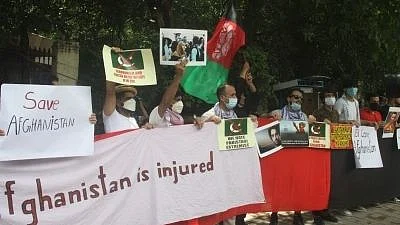A drone strike in Kabul in August, killed as many as 10 civilians, including seven children, the US military said on Friday, 17 September, apologising for what it called a "tragic mistake".
The Pentagon admitted the United States had made a "mistake" in the 29 August strike that targeted an Islamic State suicide bomber who posed an imminent threat to US-led troops at the airport, during the last few days of the US pullout from Afghanistan, reported Reuters. This was probably the last strike by the US, before ending its 20-year operation in the country.
"Our investigation now concludes that the strike was a tragic mistake," said head of US Central Command, Marine Corps General Frank McKenzie. The US officials had earlier described the drone attack as "righteous" as they were confident the move averted an imminent threat.
"I offer my deepest condolences to surviving family members of those who were killed. We apologise, and we will endeavor to learn from this horrible mistake," said US Defense Secretary Lloyd Austin in an apology to the relatives of those killed in the strike.
The US authorities said they are working out payments for the families of the bereaved.
How The Strike Happened
General Frank McKenzie told reporters that on 29 August, the US forces had tracked a white Toyota for eight hours in Kabul after intelligence reports suggested the location identified was from where Islamic State operatives were believed to be preparing attacks on the Kabul airport.
The authorities later admitted that the reports were wrong. The drone strike that McKenzie had defended as a "self-defense strike," ultimately killed no one linked to IS.
Intelligence source had reportedly spotted men loading what appeared to be explosives into the car, but it turned out to be containers of water.
The strike happened at a time when scores of Afghan civilians had gathered outside the airport gates, in a desperate attempt to board the evacuation flights, after the Taliban took over the capital.
The killing of civilians has raised questions about US-headed counter-terrorism strikes, which has become a crisis for the Biden administration.
"I don't think you should draw any conclusions about our ability to strike in Afghanistan against ISIS-K targets in the future based on this particular strike," McKenzie said, reported Reuters.
(With inputs from Reuters)
(At The Quint, we question everything. Play an active role in shaping our journalism by becoming a member today.)
